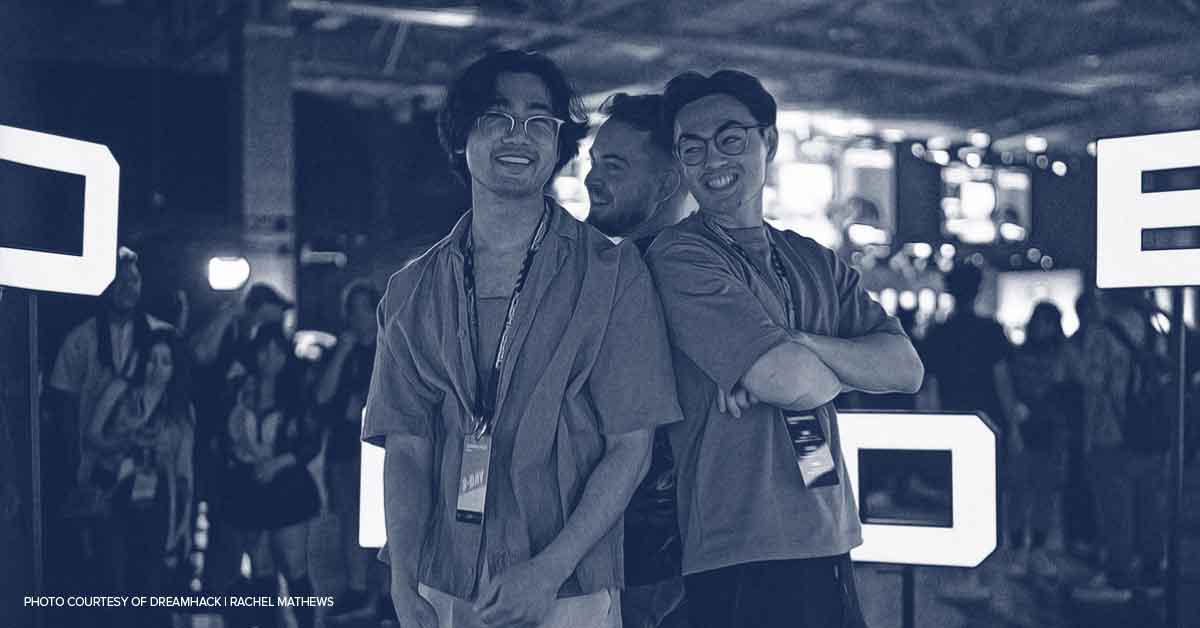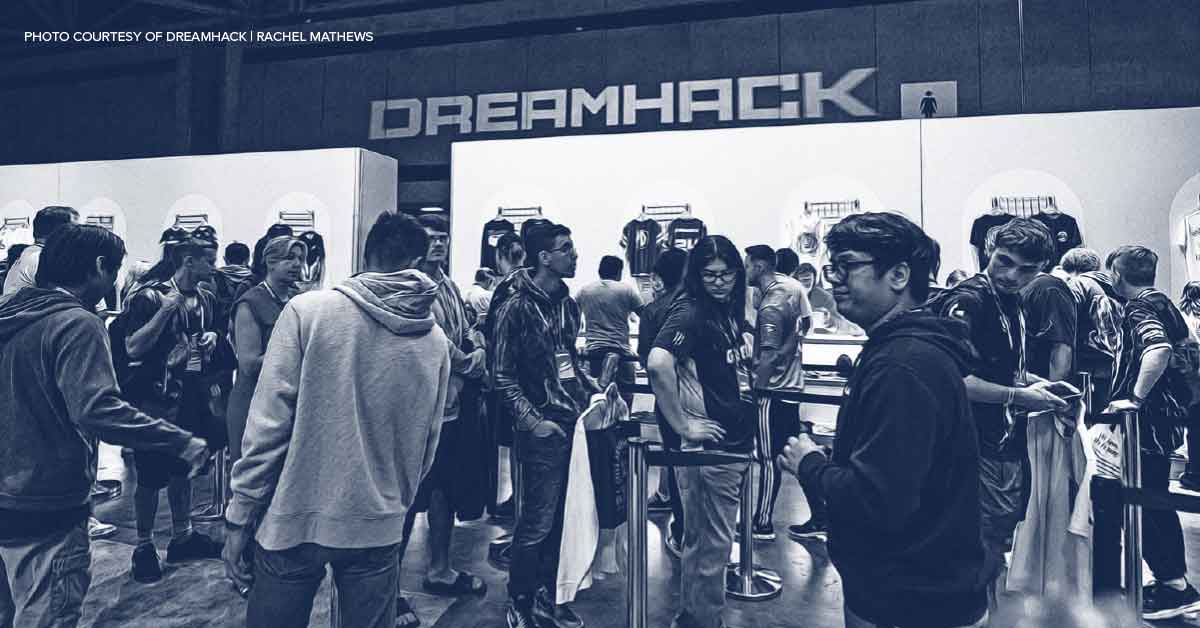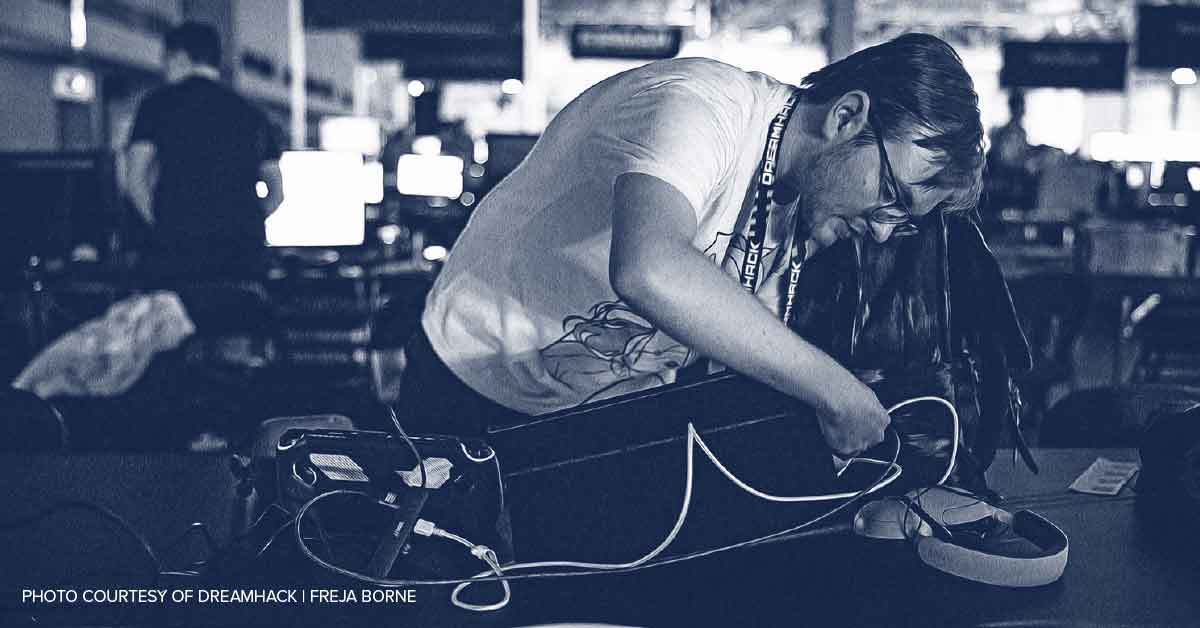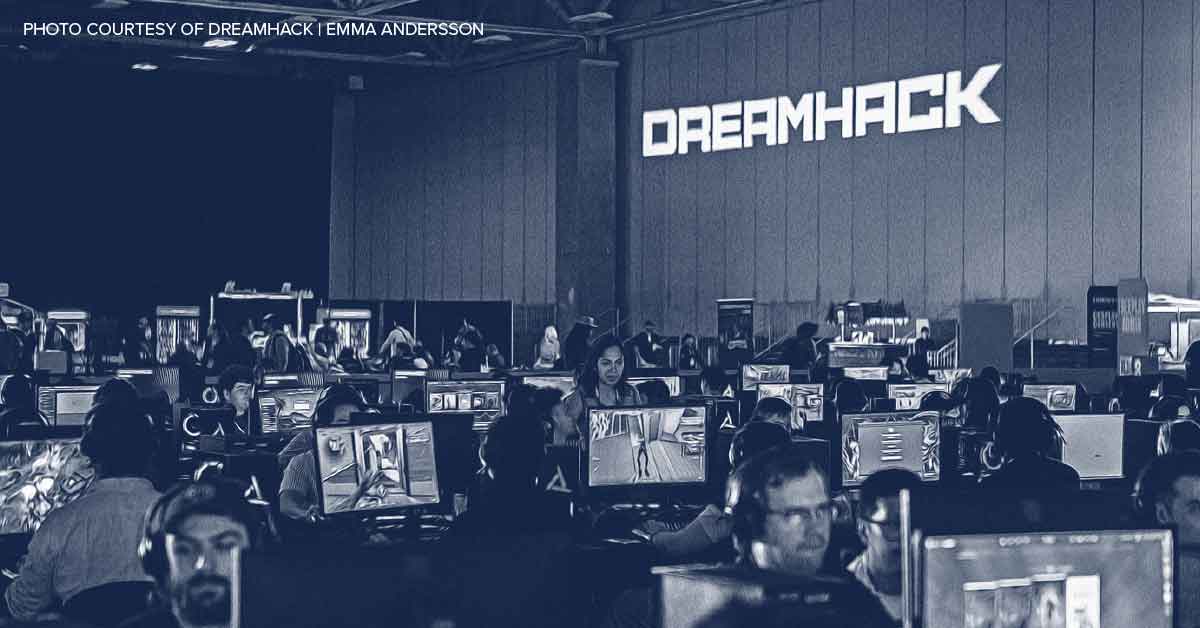
June 3, 2025
The Dallas Difference
How DreamHack Built an Esports Powerhouse in Texas
The Lone Star State’s unexpected rise as America’s esports capital, where DreamHack’s visionary blueprint has transformed Dallas into a global gaming destination that rivals Seoul and Stockholm.
By Greg Smith
June 3, 2025

The clock edges past midnight at the Kay Bailey Hutchison Convention Center in downtown Dallas, but sleep is the furthest thing from anyone’s mind. The cavernous BYOC (Bring Your Own Computer) area—the beating heart of DreamHack—hums with activity as hundreds of gamers settle in for a weekend-long digital marathon. Some have brought elaborate PC setups complete with custom lighting that transforms their stations into miniature spectacles. Others huddle in teams, strategizing for tomorrow’s amateur tournaments with the same intensity as the pros competing on the main stages.
This is DreamHack Dallas—a gaming festival that transforms 650 S Griffin Street into a temporary digital nation for three days each year. With over $2 million in prize pools across multiple esports competitions including Counter-Strike, Call of Duty, and Brawl Stars, it’s become North America’s premier gaming event. But the real story isn’t happening on the tournament stages or even on the convention floor—it’s in the economic ripple effects that have transformed Dallas into an unlikely esports capital.
“Dallas is a city well known for its many sports teams and being a central hub for esports in the state of Texas, but also for the whole of the U.S.,” explains Guy Blomberg, Senior Director of DreamHack Festivals - Americas. What began as an ambitious experiment in 2019 has evolved into something far more significant: a case study in how cities can leverage gaming culture to build entirely new economic ecosystems.
THE PERFECT MATCH
INFRASTRUCTURE MEETS VISION
Behind every successful partnership lies a foundation of mutual benefit. For DreamHack and Dallas, this foundation was built on complementary strengths—a world-class venue and a city eager to diversify its identity.
“One of the most important factors we take into consideration is the infrastructure,” explains Guy Blomberg, Senior Director of DreamHack Festivals - Americas. “DreamHack is a large-scale festival, and we want to ensure our fans are getting the best possible experience. Dallas’ Kay Bailey Hutchison Convention Center is ideal for hosting our multi-day festival.”
What makes this venue particularly special is its ability to accommodate the unique demands of a modern gaming festival. “In this venue, we combine everything great a DreamHack festival has to offer with esports, as we’re also hosting numerous big-scale tournaments like Intel Extreme Masters or the Call of Duty League Major,” Blomberg continues.
For the Dallas Sports Commission, the partnership represented an opportunity to position the city at the forefront of a digital revolution. “Hosting an event like DreamHack in Dallas aligns with our vision to diversify our event portfolio and position Dallas as a leader in innovative sports,” their spokesperson explains.
This alignment of interests has proven remarkably successful. What began as a single event has evolved into a cornerstone of both organizations’ strategies, with the annual festival generating millions in economic impact while cementing Dallas’ reputation as America’s premier esports destination.
BEYOND THE CONTRACT
CREATING A CIVIC PARTNERSHIP
What truly distinguishes the DreamHack-Dallas collaboration from other event-host relationships is how deeply the city has embedded itself in the festival’s success. This isn’t a traditional venue rental—it’s a genuine civic partnership.
“The local government and Dallas Sports Commissions have been very supportive,” notes Blomberg. “Helping us streamline logistics and create an environment that not only attracts a huge fan base but also encourages innovative sponsor activations.”
The Dallas Sports Commission confirms this collaborative approach: “The Dallas Sports Commission, the City of Dallas, the Kay Bailey Hutchison Convention Center Dallas, and local hotels work collaboratively to bring events like DreamHack to the convention center. We work closely with ESL FACEIT Group (EFG) each year to ensure that the community fully embraces and enhances the festival.”
This support extends far beyond permitting and promotion. It represents a fundamental rethinking of how cities can engage with digital entertainment. “City officials and the Sports Commission have been instrumental in not only positioning us and connecting us with key local contacts, but also in fostering city-wide engagement and support for the event,” Blomberg explains. “We can build the show, but having the sense of celebration spread beyond the convention center is where their support really shines through.”
This city-wide embrace transforms DreamHack from a convention center event into a civic celebration—one that has even been formally recognized with its own holiday. In 2023, Dallas Mayor Eric Johnson proclaimed June 2nd as “DreamHack Day,” acknowledging the festival’s profound impact on the city’s culture and economy.
THE INVESTMENT STRATEGY
BUILDING DIGITAL INFRASTRUCTURE
While many cities approach esports events with a wait-and-see attitude, Dallas has distinguished itself through bold infrastructure investments specifically designed to support gaming and digital entertainment.
According to the Dallas Sports Commission, “The KBHCCD has invested in high-speed internet infrastructure that enhances support for esports and technology-based events. These investments ensure that the venue can host large-scale events like DreamHack seamlessly.”
These aren’t modest upgrades—they represent a fundamental commitment to digital excellence. The city recognized early that the technical requirements for esports events differ dramatically from traditional sports or conventions, requiring specialized infrastructure to deliver world-class experiences.
This forward-thinking approach extends to future development plans. “The KBHCCD will soon undergo an expansion to re-envision downtown Dallas’ convention center district,” the Commission adds, signaling Dallas’ long-term commitment to maintaining its competitive edge in the digital entertainment space.
The practical benefits of this infrastructure-first approach are readily apparent to event organizers. “Logistically Dallas is a travel hub which has always been a benefit to us, and having a connected hotel is incredibly helpful for our attendees,” notes Blomberg. “Hosting an event in May can tend to be a little warm, so having travel options within the same venue are definitely appreciated by our attendees!”
By prioritizing digital infrastructure, Dallas has created a venue ecosystem that feels purpose-built for modern entertainment—a key factor in DreamHack’s decision to make the city its flagship North American location.
THE ECOSYSTEM CATALYST
BUILDING YEAR-ROUND IMPACT
Perhaps the most innovative aspect of the Dallas-DreamHack partnership is how it has transformed a weekend event into a year-round economic engine—creating a self-sustaining esports ecosystem that operates 365 days a year.
“Hosting DreamHack has significantly bolstered Dallas’s year-round esports presence by becoming a pillar for local esports organizations, fostering local talent, and enhancing community engagement,” explains the Sports Commission spokesperson. “The event serves as a platform for developing a robust local esports scene.”
This ecosystem effect has created a clustering phenomenon similar to what happened with tech in Silicon Valley or film in Hollywood. “Dallas is a strong hub for esports teams and competitive environments, so you’ll see a lot of local teams showing up for this DreamHack specifically,” Blomberg notes.
The impact extends to game development as well. “We also have a strong connection to the local game developer scene. Our Indie Playground will feature over 50 developers, many of them local, where we are subsidizing their booth space to support them.”
The result has been a transformation of Dallas’ digital landscape. “Since hosting DreamHack, a variety of esports organizations and gaming companies continue having operations in Dallas,” the Commission confirms. “These organizations include Optic Gaming, professional teams, game developers, and many more.”
This economic diversification represents perhaps the most significant innovation of the partnership—using an annual event as a catalyst for year-round business development and talent attraction. It’s a strategy that other cities are now rushing to emulate, but Dallas’ first-mover advantage has established a lead that will be difficult to overcome.
THE EDUCATION APPROACH
BRINGING STAKEHOLDERS ALONG
Rather than attempting to force esports into the traditional sports or entertainment model, the Dallas-DreamHack partnership has succeeded by educating stakeholders about the unique opportunities presented by digital entertainment.
“Dallas has historically been at the cutting edge in both the technology and events space, but an in-person esports festival was largely unheard of prior to our time hosting DreamHack,” the Sports Commission spokesperson acknowledges.
The partnership’s success has converted skeptics into believers. “Due largely in part to ESL FACEIT Group’s continued partnership with us, our community is invested in continuing to grow esports events in the region. Growing the event landscape on top of all the esports businesses based here has shown more traditional business owners how much the gaming industry can benefit their businesses.”
This educational approach has paid remarkable dividends. “Interest in esports has rapidly grown in the last decade. It is now commonplace for business owners themselves, traditional athletes, and community leaders to already have an invested interest in gaming.”
By positioning esports as an opportunity for education rather than as a replacement for traditional entertainment, Dallas has created a model that brings stakeholders along rather than fighting against resistance—an approach that has accelerated adoption and integration.
THE INCLUSIVE VISION
BUILDING A MULTI-GENERATIONAL COMMUNITY
Unlike many gaming events that target a narrow demographic, DreamHack Dallas has distinguished itself by creating experiences that appeal across generations—making it a family destination rather than just a youth event.
“The DreamHack Dallas audience reflects the overall trends in the gaming industry, with more of an even spread between genders and an average age that skews a little older,” Blomberg observes. “We feature so many esports stages and creator content that appeal to a younger demographic, as well as families where the parents get to bring their kids to the festival to show them games they played when they were their age. Gaming really does have universal reach and appeal, and DreamHack reflects that.”
The Dallas Sports Commission confirms this broad appeal: “The local community has responded enthusiastically to DreamHack, with high attendance and representation across generations. The event has become a cultural highlight, celebrated not only by gamers but also families and community leaders.”
This multi-generational approach has been crucial to DreamHack’s integration into Dallas’ cultural fabric. By creating events that parents and children can enjoy together, the festival has normalized gaming as family entertainment rather than reinforcing stereotypes about isolated youth activities. This cultural repositioning has been essential to building broader community support.

THE COMMUNITY BUILDERS
NURTURING GRASSROOTS TALENT
While headline tournaments often capture the most attention, the Dallas-DreamHack partnership has excelled by focusing equally on grassroots community building—creating pathways for local talent to develop and thrive.
“Connecting with the local artists, indie developers, charities, creators, and community associations has been a key success for us in Dallas,” Blomberg explains. “In particular, the growth of our Creator Hub and the amount of registered creators and streamers we feature at the show has grown significantly every year.”
This community focus extends beyond the annual event through year-round engagement strategies. “We also have a strong community on Discord and social media where we run competitions and activities,” notes Blomberg, highlighting how digital platforms maintain momentum between physical gatherings.
The Sports Commission’s future initiatives will double down on this grassroots approach, focusing on “continuing to work on community investment, working with local esports businesses to highlight the work already being done in Dallas, and furthering education for local leaders about the dynamic and impactful world of esports.”
By developing local talent alongside imported stars, Dallas has created a more sustainable ecosystem with deeper community roots—one that generates its own momentum rather than requiring constant external stimulus.
THE ECONOMIC ENGINE
DELIVERING MEASURABLE RESULTS
The Dallas-DreamHack partnership isn’t just about creating cultural cachet—it’s delivering tangible economic benefits that justify the city’s investment and build political support for continued expansion.
The impact has grown dramatically since the partnership began. “DreamHack Dallas continues to provide a substantial impact on direct spending and Dallas’s tourism industry, with more than 35,000 visitors, contributing over 40 million in direct spending to the Dallas economy,” revealed Mayor Eric Johnson in his 2023 DreamHack Day proclamation.
The 2024 event broke all previous records, with Blomberg confirming it was “the largest DreamHack ever in terms of size and attendance numbers,” setting a new benchmark for North American esports festivals.
These economic benefits extend well beyond ticket sales and venue fees. Hotel bookings, restaurant visits, transportation, and retail spending all increase dramatically during the festival, creating a multiplier effect that benefits the broader Dallas economy.
The event’s prize pools have also grown substantially, from under $1 million in early years to over $2 million for the 2025 festival—creating additional incentives for competitors and spectators to travel to Dallas and generating media coverage that raises the city’s profile in the digital entertainment space.

THE REPLICATION CHALLENGE
CAN OTHERS FOLLOW SUIT?
As other cities witness Dallas’ success, the question inevitably arises: can this model be replicated elsewhere, or is there something uniquely “Dallas” about this partnership?
Blomberg offers this guidance to aspiring esports hubs: “Look to provide clear incentives or offsets that can easily be recognized, be clear about what kind of city-wide marketing and promotional support can be offered, and most of all, make sure to get a sense of what esports and gaming are all about. We love working with cities and associations who are as excited about gaming and esports as we are.”
This last point might be the most critical—authentic enthusiasm trumps performative support. Cities that genuinely embrace gaming culture rather than simply chasing economic development dollars will likely find more success in building lasting ecosystems.
The Sports Commission maintains ambitious goals that suggest they aren’t worried about competition: “In the next 5 years, we hope to continue to grow our partnership with ESL FACEIT Group. We want to help develop DreamHack Dallas as the must-attend esports event in North America.”
“Seeing the success that live esports events can have, we are more invested than ever to continue hosting DreamHack and other esports events in the region for years to come,” they add, demonstrating a commitment to continuous improvement rather than resting on past achievements.
THE DALLAS DIFFERENCE
A MODEL FOR THE DIGITAL AGE
The DreamHack-Dallas partnership represents more than a successful event strategy—it’s a template for how cities can embrace digital entertainment as a cornerstone of their identity in the 21st century.
By approaching esports with the seriousness traditionally reserved for major sports or cultural institutions, Dallas has positioned itself at the forefront of a global entertainment revolution. The city hasn’t just hosted events; it has transformed itself into a year-round hub where digital culture and physical community reinforce each other.
The Dallas Difference, at its core, is about vision—seeing esports not as a passing trend but as a fundamental shift in how future generations will experience entertainment, competition, and community. By recognizing this shift early and investing in the infrastructure, relationships, and education needed to thrive in this new landscape, Dallas has created a model that other cities are now rushing to emulate.
As esports continues its trajectory from emerging interest to dominant entertainment form, the Dallas model offers a roadmap for forward-thinking cities. The lesson is clear: successful esports ecosystem development requires more than venues and marketing—it demands authentic engagement, infrastructure investment, community building, and a genuine appreciation for gaming culture.
The cities that embrace this holistic approach, as Dallas has done, won’t just host successful events—they’ll build thriving digital ecosystems that generate economic opportunity and cultural vitality for decades to come. In the growing competition to become esports destinations, the Dallas Difference isn’t just about being bigger—it’s about building better, more sustainable connections between digital entertainment and urban identity.
Categorized in: EsportsNext Magazine




